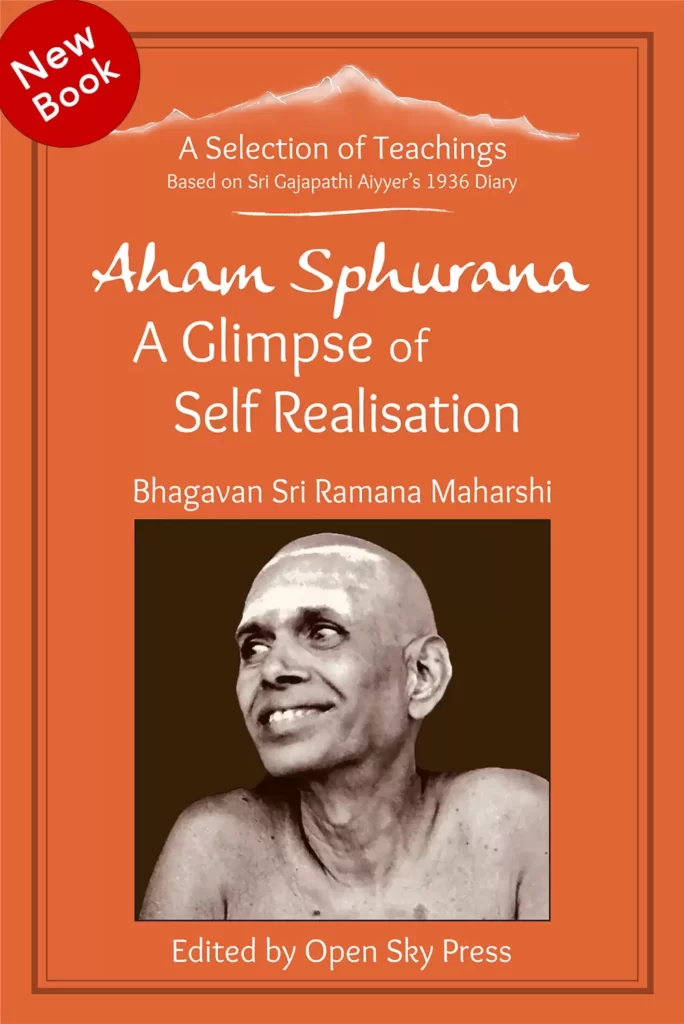
Aham Sphurana
A Glimpse of Self Realisation
New Book about Sri Ramana Maharshi

Available Worldwide
On www.openskypress.com and Amazon:

“In my opinion, Aham Sphurana, a Glimpse of Self Realisation, will become a Treasure Trove of Wisdom to the Seekers of Truth in general, and particularly to the devotees of Bhagavan.”
Swami Hamsananda – Athithi Ashram, Tiruvannamalai
Only the Self, No God
Ramana Maharshi on God
Pages 115-120
Q.: What is the difference between jivanmukti[ and videhamukti?
B.: There is no difference. They say that the jivanmukta attains videhamukti when the body dies. But think can there be anything which he has yet to attain? Such differences are exclusively from the point of view of the onlooker. They do not exist from the Jnani’s point of view. There is no change in the Jnani’s state before or after abandoning the body.
Q.: Can presence of body-consciousness not be inferred from the fact that the body is alive? Can we say that one with body-consciousness has attained Emancipation?
B.: Who told you that the Jnani has body-consciousness? When the knot between the sentient and the insentient is sundered, body-consciousness is irrevocably lost.
Q.: Can the body be alive without body-consciousness?
B.: Why not? The body is only an inert mass of organic chemicals. It has no “I”-sense about it. Do you think the word ‘Life’ refers to or connotes one’s bodily or biological existence? ‘Life’ means ‘Consciousness’. Consciousness or one’s awareness “I-AM” is never lost in all the 3 states.
Jagratchethanam passes. I am. Supthachethanam passes. I am. Rikthachethanam passes. I am. I always am. Let the derivatory- consciousness assume any form it likes. The parent-consciousness “I- AM” is always there. It is known as mahat in Vedantic language. If that is steadfastly held on to it is discovered that the body is only an appearance in and of the Self. Only then does the idea that it is the body which is responsible for harbouring one’s Life fade away and die out completely.
Q.: If everything is an illusion, is God at least Real?
B.: Are you aware of God in your deep sleep?
Q.: No.
B.: What is the inevitable inference?
Q.: So God also is just a myth, as is the case with the world- is that right?
B.: God is real only if and until mind or ego remains.
Q.: What about the Impersonal Absolute- which Bhagavan calls ‘the Self’?
B.: In His case who do you think is available to raise this or any other question?
Q.: What about the not-Self?
B.: What is meant by ‘not-Self’?
Q.: That which is not the Self.
B.: Impossible. There cannot be anything apart from the Self.
Q.: What about the ego?
B.: Whose ego?
Q.: So really the ego does not exist at all?
B.: No. Mind or ego is fictitious fiction. The moment “I” tries earnestly to know itself, it finds itself to be the Self. But this cannot happen whilst any vishayavasana, poorvasamskarara, or other chitta-vritti lies latent in the mind. That is why the practice of vichara, which steadily destroys all chitta-vrittis of mind, is advocated. Vichara succeeds only if it is deployed continuously and incessantly.
Q.: How then is worldly work to be carried on?
B.: Both vichara and worldly work can be carried on concurrently.
Q.: Vichara aims at a state of mind wherein there is no movement of thought waves.
B.: Correct.
Q.: On the other hand, worldly work requires me to think thoughts.
B.: Not correct.
Q.: I am an architectural engineer. While drawing up plans, do I think ‘Who am I?’ or do I think ‘What measure of length shall this facade extend up to?’
B.: That is the mistake.
Q.: What?
B.: You are under the impression that performance of vichara merely involves asking yourself ‘Who am I?’ That is just the first step. As you yourself, vichara aims at a state of mind wherein there is no movement of thought waves. This cannot be brought about just by asking yourself ‘Who am I?’ The question ‘Who am I?’ is only meant to arrest further progress of the thought that you incumbently happen to be thinking. After the present thought has been curtailed, take the mind back to its source, which is the primordial state of subjective-awareness sustained effortlessly and volitionlessly.
When you are in this state, neither the thought ‘Who am I?’ nor any other thought should disturb you; if it does, ask yourself ‘Who am I?’ and come back immediately to such state. ‘Who am I?’ is an axe with which to chop down thoughts as and when they occur, at once. After the current thought has been struck down, the mind must retreat into its natural state. The question itself is only a tool to help you move from the realm of thought to the realm of effortless and volitionless stillness of mind. A still mind is a mind that is exclusively subjectively aware.
When by means of and as a result of having extensively practised in this manner you are able to remain effortlessly and volitionlessly still, all the work that it is the body’s prarabdha to carry out will go on of its own accord like clockwork. You will then be surprised at the efficaciousness and efficiency achieved by you, although you never in fact did anything! So, whilst drawing up plans for constructing buildings, think neither ‘Who am I?’ nor think any other thought, but keep your mind still. Then the work will go on of its own accord.
Q.: Is this natural state of mind mentioned by Bhagavan the same as the Parabrahman mentioned in the Upanishads?
B.: No. He is the Beyond.
Q.: How then shall I know Parabrahman, which is the final goal of human- birth according to the sastras?
B.: The natural state of mind to which thought, desire, aspiration, volition or effort are altogether alien, will of its own accord take you there. But you cannot have It overnight. Sustained practice is necessary to uproot all your ancient vasanas and other chitta-vrittis.
Q.: If mind must be destroyed before there can be possibility of Realisation, the question arises: how did the mind arise, and why?
B.: There is already no mind. Searching for the mind, we arrive at the Self. Mind can never be found. How to find something that is not there at all? What never could be never was. What cannot be is not. What IS, is only that which IS, and That is the Self. Speaking from the point of view of mind, it certainly will not be possible for you to deny the existence of mind. The only way to genuinely discover the mind’s non-existence is to Realise the Self and vice versa.
Q.: Bhagvan’s words make a powerful impact on me. But will I remember them?
B.: There is no need to force yourself to remember anything. The words of Sages are not meant to be verbatim memorised. You may practice vichara when you remember me, but don’t try to ‘do’ anything else with whatever you have listened to here. Let the words sink deep within your mind. When the time comes they will do their work.
Birds drop their seed containing excreta on all sorts of terrain. In some terrain the sprouting is immediate. In others it takes time because favourable conditions have to arrive before germination can take place. There will come a time when you cannot rest content until you have Realised the Self. The longing to wake up or discover Reality grows slowly in the mind of the neophyte. In due course of time, it kills all other thoughts and emerges as the one sole thought or concern supremely dominating or exclusively occupying the mind.
That is the stage when the aspirant is ready to plunge the mind in the Heart so that it stands annihilated there once and for all. The thirst for Jnana must be permitted to wax undisturbed in the mind. It is like the pernicious water hyacinth weed irrevocably choking the entire ecological system of a water body to death. The weed drifts in upon the pond as a tiny seed. In due course of time it multiplies itself rapidly and shuts off access to sunlight to the other living organisms inhabiting the pond. How? It covers the entire surface of the pond. Nothing in the pond can survive.
Likewise, if Guru’s Grace is available, the seed of Jnana planted by the Sage multiplies into the great-destroyer[mahaviksheenaka] of illusion which chokes the mind to death. How? It covers the entire surface of the mind with the blazing fire of vairagya- i.e., revulsion towards samsara.
Q.: So until then I just have to wait?
B.: No; go on with your effort in investigating ‘Who am I?’ But only when the present, mundane bodily-existence has become completely, intolerably unacceptable will the effort bear fruit.
Edited by John David Oct 2021
Aham Sphurana
A Glimpse of Self Realisation
New Book about Sri Ramana Maharshi

Available Worldwide
On www.openskypress.com and Amazon:

“In my opinion, Aham Sphurana, a Glimpse of Self Realisation, will become a Treasure Trove of Wisdom to the Seekers of Truth in general, and particularly to the devotees of Bhagavan.”
Swami Hamsananda – Athithi Ashram, Tiruvannamalai







